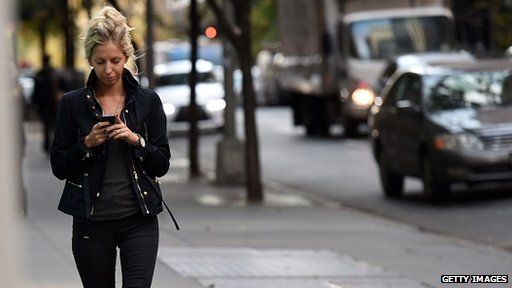Battery power alone can be used to track Android phones
- Published

Android phones can be tracked without using their GPS or wi-fi data by studying their power use over time, a study has found.
A smartphone uses more power the further away it is from a cellular base and the more obstacles are in its way as it reaches for a signal.
Additional power use by other activities could be factored out with algorithms, the researchers found.
They created an app designed to collect data about power consumption.
"The malicious app has neither permission to access the GPS nor other location providers (eg cellular or wi-fi network)," the team - Yan Michalevsky, Dan Boneh and Aaron Schulman, from the computer science department at Stanford University, along with Gabi Nakibly, from Rafael Ltd - wrote in their paper.
"We only assume permission for network connectivity and access to the power data.
"These are very common permissions for an application, and are unlikely to raise suspicion on the part of the victim."
There are 179 apps currently available on Android app store Google Play that request this information, the team add.
Activity such as listening to music, activating maps, taking voice calls or using social media all drain the battery but this can be discounted due to "machine learning", the report says.
"Intuitively the reason why all this noise does not mislead our algorithms is that the noise is not correlated with the phone's location," it says.
"Therefore a sufficiently long power measurement (several minutes) enables the learning algorithm to 'see' through the noise."
The tests were carried out on phones using the 3G network but did not measure signal strength as that data is protected by the device.
'Stuffed with sensors'
"With mobile devices now becoming ubiquitous, it is troubling that we are seeing so many ways in which they can be used to track us," said cyber-security expert Prof Alan Woodward, from Surrey University.
"I think people sometimes forget that smartphones are stuffed full of sensors from gyroscopes and GPS to the more obvious microphones and cameras.
"This latest work shows that even that basic characteristics (power consumption) has the potential to invade privacy if monitored in the right way," he added.
"We are approaching the point where the only safe way to use your phone is to pull the battery out - and not all phones let you do that."
- Published21 February 2015
- Published18 February 2015
- Published22 December 2014
- Published10 February 2015